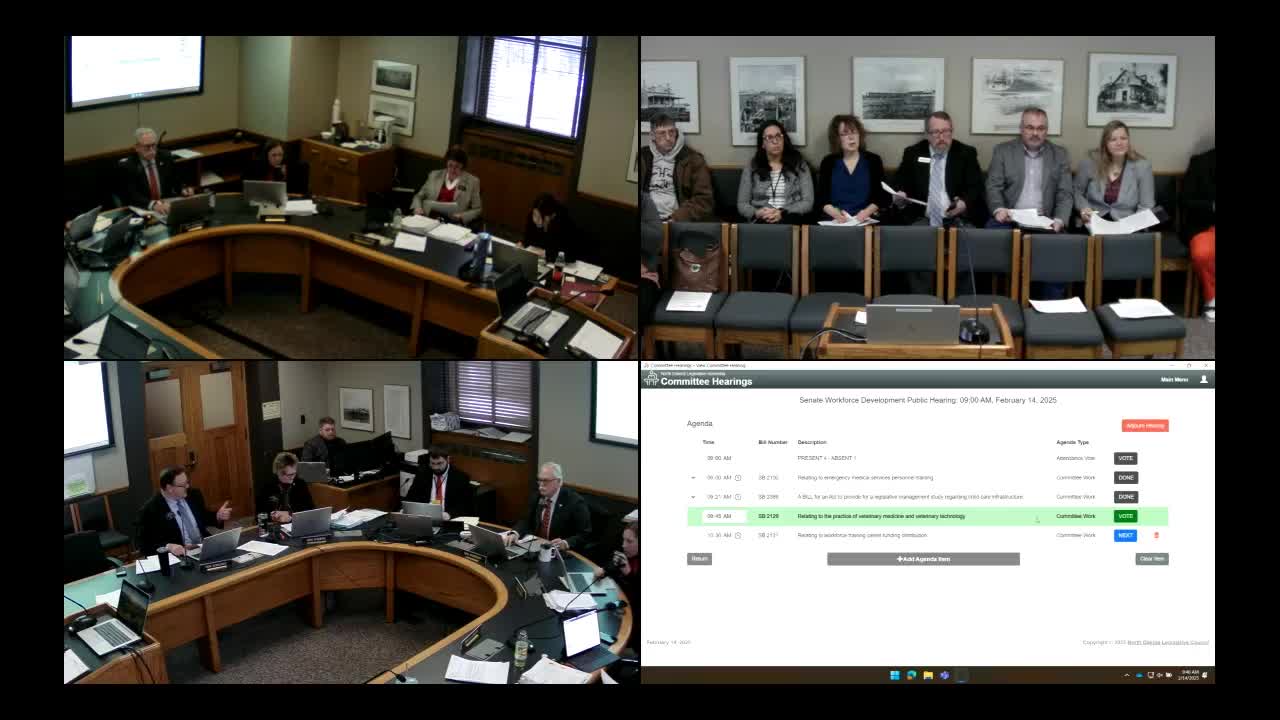Committee advances broad veterinary practice update with amendments addressing licensure, telehealth and discipline
Get AI-powered insights, summaries, and transcripts
Subscribe
Summary
The Senate Workforce Development Committee approved an amended version of Senate Bill 2,129, a comprehensive revision of veterinary practice law that updates definitions, exemptions, disciplinary procedures and telehealth standards.
The Senate Workforce Development Committee advanced Senate Bill 2,129, a wide‑ranging update to the state’s veterinary practice statutes, adopting several amendments reflecting negotiations among the Board of Veterinary Medicine, the North Dakota Veterinary Medical Association and other stakeholders.
Key changes the committee adopted include: replacing or clarifying terminology for an "approved" college of veterinary medicine while preserving accreditation standards in the statutory definition; clarifying exemptions so that owners acting on their own animals and common ancillary roles (grooming, farrier work, microchip implantation, conditioning, certain massage/acupressure) are not treated as practicing veterinary medicine so long as they do not diagnose or treat new conditions; revising disciplinary language to remove the term "immoral" and instead refer to "unprofessional conduct" as defined by board rule and to a board‑adopted code of ethics; adopting language modeled on an existing physician professional health program to address impaired practitioners with monitoring and treatment options rather than immediate license revocation; and tightening the veterinary client‑patient relationship (VCPR) standard for telehealth by making an in‑person examination or timely in‑person visit a required basis for establishing the VCPR before providing certain veterinary services through telehealth.
Stakeholder testimony on the changes included Board of Veterinary Medicine executive secretary Sarah Lyons and representatives of the North Dakota Veterinary Medical Association; both parties proposed compromise language on the accredited/approved college definition and indicated a willingness to accept a formulation that preserves accreditation in the definition while using the term "approved" elsewhere to preserve rulemaking flexibility.
The committee also discussed privacy between North Dakota practitioners and "foreign practitioners" (defined as veterinarians licensed in another jurisdiction). The committee adopted clarifications so that a dispensing veterinarian may rely on a presumption that the out‑of‑state prescribing veterinarian is in good standing unless the dispensing veterinarian is specifically aware of disciplinary action; the bill's language was also clarified so the statutory reference uses the broader VCPR provisions established elsewhere in the chapter rather than pointing to a single short definition.
The committee adopted three sponsor amendments (numbered proposals discussed in the hearing) and additional technical fixes (for example, replacing the word "environment" with "circumstance" where it applied to patient or client threats to safety; adjusting line numbering and deleting an accidental carriage of text across pages). After amendment votes and discussion the committee approved the amended bill and moved it forward with a do‑pass as amended recommendation to the full Senate.
Committee members and stakeholder representatives noted remaining open issues: some stakeholders asked for clearer pathways to license alternative animal health practitioners (for example, equine chiropractors), but those licensure questions were deferred because no consensus or association support for immediate licensure language existed. The committee chair and stakeholders said the changes represented major negotiated progress but that work will continue as the bill moves between chambers.
